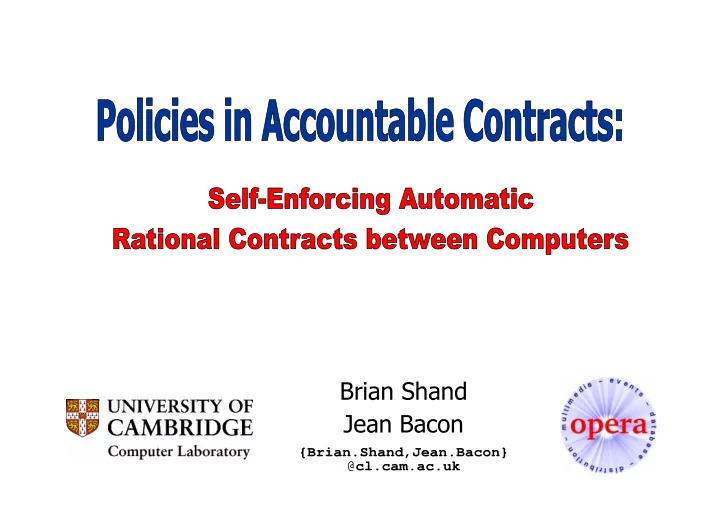

Brian Shand Jean Bacon {Brian.Shand,Jean.Bacon} @ cl.cam.ac.uk
A Tool for Profitable Distributed Services Contracts Trust • Negotiated web services, • Risk of GRID computation, SLA’s untrustworthy participants Resources • Self-funding services and quality guarantees 2
Policies in Accountable Contracts Components Policies Contract architecture Contract Selection Resource-based Contract virtual economy Performance Automatic Contract trustworthiness Monitoring measurements 3
Application Scenarios • Public compute servers (GRID computation) • Flexible prioritisation in large distributed systems • Web services • Publish-subscribe middleware – e.g. Active City 4
Contracts • Non-repudiable promises to act • Contract Definitions – A contract prescribes actions for each participant – By signing the contract, each participant promises to be bound by it – A contract is agreed upon when all participants have signed it – A contract is cancelled when everyone signs a special cancellation message • But contracts need to be prioritised 5
Resource Economy • Homogeneous model – money, trust, CPU, network, storage etc. • Multi-scale representation • Accounting of all resources { Non-repudiable promises to act. Contracts Allow planning. { Resource Model Introduces cost and risk. Accounting { Bind contracts and resources together. Functions Can prioritise and monitor contracts. 6
Contracts and Accounting • Accounting • Multi-scale Contract Language Representation 1. Limited language: 1. Server and client identities predictable execution time 2. Expected resource 2. High-level description of requirements resource exchange 3. Accounting function 3. Allows introspectible (payment policy) contracts 4. Actions to perform Example: Accounting Functions def accountEg2 (self,atom,imports): if atom.type==resources.cpuTime: def accountEg1 (self, atom, if imports[0] > 0.10: imports): rate = imports[0] rate = 1.10*imports[0] else: rate = 0.10 return [ResourceAtom( return [ResourceAtom( resources.money,'£', resources.money,'£', rate*atom.quantity)] 7 rate*atom.quantity)]
Accounting Policy Complex code example: def processResourceAtom(self, atom, imports): if atom.type != resources.cpuTime: return [] # Charge for CPU only rate = imports[0] if self.totalCPU < 10: result = rate+0.01 else: result = rate+0.002 self.totalCPU += atom.quantity return [ResourceAtom(resources.money, '£', result*atom.quantity) ] • Accounting functions allow: – Contract policy specification – Contract prioritisation – Risk estimates with limited resource outlay 8
Trust Monitoring • Subjective trust model (Jøsang, 2001) Uncertainty (0,0,1) – Trust, distrust, uncertainty – Based on local assessments of trustworthiness – Constantly updated with new data (1,0,0) (0,1,0) Trust Distrust • Trust delegation certificates – Web of trust, c.f. PGP recommendations – Distributed trust management; standing surety – Subsume reputation agencies 9
Integrating the Three Strands { Non-repudiable promises to act. Contracts Allow planning. { Resource Basis for accounting. Model { Bind contracts and resources. Accounting Functions But: Need sanctions for cheats. Trust { Models expected contract payment. Model Constantly re-assessed. Scheduled according to expected { Accountable Contracts profitability. Contracts mediated by trust. 10
Contract Policy Trade-offs Selection of New Contracts Consistency vs Flexibility Gambling for Profit Performance of Profit Monitoring Overheads Existing Contracts Incentive 11
Conclusion • Accountable contracts support profit-based distributed services • Separation of task acceptance and performance – introspectible, automatic contracts – explicit risk assessments • Allows flexible policy specification • Further work: – Explicit integration of reputation into contracts – Theoretical basis for trust model – Developing prototype applications 12
Recommend
More recommend